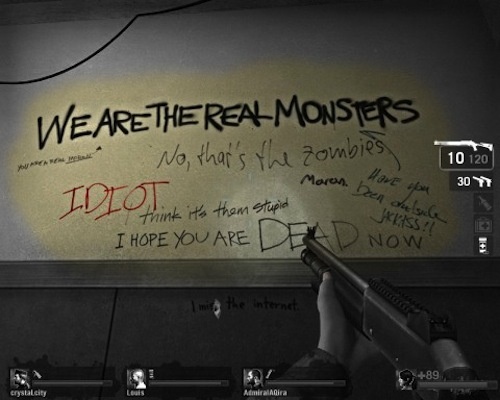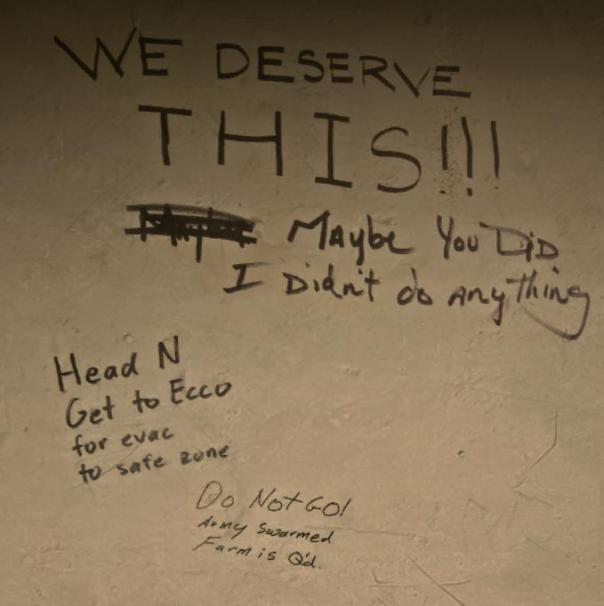Category Archives: Spec Fic Genres
Human cruelty
Posted by VintageZombie
One of the clearest themes in horror, and other genres besides, is pointing out human cruelty. The desire to stay alive in a zombie apocalypse leads some people to sacrifice others so they can live (usually rich and rude jerks we don’t care about living anyway). One of my favourite Twilight Zone episodes is The Shelter, where people do ask ‘Why should your family live while mine dies?’
In Zombies, Vampires and Philosophy, Leah Murray refers to Thomas Hobbes claim that life in a “state of nature”, without government or authority, is “solitary, poor, nasty, brutish and short” . Murray extends this to the zombie apocalypse, looking at Romero’s Dead series. In thinking about recent battlegrounds, you could go further and apply this to jerks on the inernet – with anonymity and seeming no authority or law, people are free to call you whatever negative terms they can think of (although I do think ‘baddie’ is a stupid term).
Hiding away food, weapons, information is fairly common – especially outside of horror. But there are other examples of human cruelty that is not against each other. Cruelty against weak/helpless zombies is common, usually red necks picking them off, blowing them up, stringing them up and using them as target practise. Admittedly, this could just be a reflection of what could be our cruelty to each other if we had anarchy.
There’s nothing in the world I love like a person who likes and is kind to animals, especially my cat. There are quite a few heroes in the zombpocalypse who still look after animals and share meager stores with them (non-zombiepocalypses too!). Human cruelty is seen in so many ways and with varying levels of severity. Some see horse jumping as cruelty. Dog fights are definitely cruel. I forget where it’s from, whether academic or fiction, but I remember a saying that our civilisations worth is based upon how we treat our smallest, our weakest.
Posted in Books, Films/TV, Social, Spec Fic Genres
Tags: horror, internet community, Romero, survivors, sympathy, Twilight Zone
The future for humanity
Posted by VintageZombie
Much like the Doomsday Clock, fiction is indicator of the future. Think of all the inventions that were created or are currently being developed after being shown on Star Trek, or the Invisibility Cloak from Harry Potter.
But a lot of modern fiction doesn’t show the utopia that Star Trek did, much more like Battlestar Galactica (and Caprica, which was killed too soon!). Two non-zombie books are particularly prominent for me, The Human Rites trilogy by Ian Irvine and The End Specialist by Drew Magary.

A million lifetimes at your disposal: what would you do with them?
What good is an eternal life if everyone you care about is dead?
The End Specialist shows a world where a cure is created that has the side effect of pausing the ageing process. While you can still die from a gun shot or cancer, you will never die of old age. Think of what that means where nature has been tamed. More people will live on. In a world already overpopulated, what does it mean when death becomes rare?

From bestselling Australian author and environmental scientist Ian Irvine comes a chillingly realistic thriller that will have you asking:
Is there life after global warming?
The Human Rites trilogy by Ian Irvine (The Last Albatross, Terminator Gene, The Life Lottery) is a story that is much closer to home. There is no magical scientific discovery, but it shows a cruel, twisted world that has developed from what we have now. Global warming, the drying up of natural resources, over-population, and still humanity is in denial of how royally screwed up the world is.
~
Both books deal with issues that you see often in zombie texts. Humans consuming, not producing. Human greed. Human comfort above all else. Humans in vast amounts of denial. There are more than just these two books, but these I have and really enjoy. They show a truly screwed up world.
What will happen when over-population goes too far? Will politicians let it go, or institute some sort of one-child policy or eugenics? Or will the earth/spiritual blob create an ice age, plague or meteor to thin us out?
What will happen when everyone wants to be a lawyer and no one wants to be a farmer? There’s already a shortage of production jobs, and waves of rural students who go to the city.
What about when our technology outstrips us and goes all Terminator/Cylon/Robopocalyse (Daniel H Wilson) on us and our creations become our doom?
What does love and marriage mean when your life is forever at risk, or what does ‘until death do us part’ mean when you are expected to live for centuries?
What point is there in school and education when you will either live millennia or barely decades? When death is staved off, or always around the corner.
Why live when life is so limited that you can’t make a difference? Or why make a difference now when life is eternal?
~
Recommended Reading
- I Shopped with a Zombie by Philip Horne in Critical Quarterly vol 24, no 4
- The Idle Proletariat: Dawn of the Dead, Consumer Ideology an the Loss of Production Labor by Kyle William Bishop in the Journal of Popular Culture, vol 43, no 2 2010
- Eating Dawn in the Dark: Zombie desire and commodified identity in George A Romero’s Dawn of the Dead by A Loudermilk in Journal of Consumer Culture vol 3 (1)
Posted in Books, Cultural, Journals and articles, Social, Spec Fic Genres
Tags: book, fiction, future, non-undead, recommended reading, social anxiety, survivors
We are the real monsters
Posted by VintageZombie
Horror is about making us uncomfortable. There’s a brilliant scene in many zombie texts where someone is confronted with having to kill their loved one or be eaten and turned. Is the one they loved still inside somewhere?
In the cult of zombie post, I listed some ‘things’ that zombies could stand for, as the creator’s (whether intended or not) response or reaction to social anxieties. Below that is what the zombies mean for humanity. Zombies are not just there to point out our fear of plagues or being eaten alive. They are both a reflection and an evolution/devolution of us, depending on the text and means of zombification.
As not so subtly alluded to before, in every zombie work, there’s always a jerk. Someone who puts their own interests above anyone else and is willing to risk destroying what is left of the human race to get what they want. Sometimes it’s the most frivolous of things: money or goods. What you spend your life before now gaining is nothing but useless baggage. Think your plasma/LED TV can help you out in the zombie apocalypse? What junk it is when there are beasts outside hungering for your flesh!
Patricia Kerslake writes in Science Fiction and Empire: “how we see the Other depends on where we stand”. Horror, fantasy, our creations are not alone in metaphor. We fear each other most of all. We fear ourselves.
(Images from Left4Dead 2 walls. If you play, slow down and read them, some are funny and some are written in Japanese (of which my L4D buddy majored in Japanese and read it for me!))
Best New Zombie Tales vol 2
Posted by VintageZombie
I won a zombie book! One of the authors, Narelle Harris (also author of The Opposite of Life) ran a competition with Rowena C Daniells for two books, one vampire, one zombie. What was I to do?
Read Narelle’s interview on writing, genre, and of course zombies.
Interested in the book? You can buy it here. Narelle’s story is The Truth About Brains. Can’t wait to read it!



